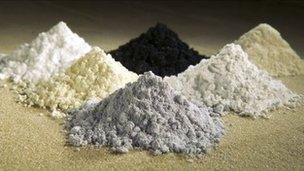US to build $120m rare earth research institute
- Published

The US Department of Energy is giving $120m (£75m) to set up a new research centre charged with developing new methods of rare earth production.
Rare earths are 17 chemically similar elements crucial to making many hi-tech products, such as phones and PCs.
The Critical Materials Institute will be located in Ames, Iowa.
The US wants to reduce its dependency on China, which produces more than 95% of the world's rare earth elements, and address local shortages.
According to the US Geological Survey, there may be deposits of rare earths in 14 US states.
Besides being used for hi-tech gadgets, the elements are also crucial for manufacturing low-carbon resources such as wind turbines, solar panels and electric cars, said David Danielson, the US assistant secretary for renewable energy.
"The Critical Materials Institute will bring together the best and brightest research minds from universities, national laboratories and the private sector to find innovative technology solutions that will help us avoid a supply shortage that would threaten our clean energy industry as well as our security interests," he said in a statement.
Rare earth elements are also used for military applications, such as advanced optics technologies, radar and radiation detection equipment, and advanced communications systems, according to a 2011 research report by the US Government Accountability Office.
Recycling issue
From the 1960s until the 1980s, the Mountain Pass mine in California made the US the world leader in rare earth production, but it was later closed, largely due to competition with the elements imported from China.
At the moment, the regulations surrounding rare earths mining in the US are very strict, an expert on the materials from Chalmers University of Technology in Sweden told the BBC.
"The Mountain Pass mine was [also] closed down for environmental reasons," said Prof Christian Ekberg.
"There are rare earths deposits that are troublesome, those containing sulphur and those containing radioactive substances such as uranium and thorium, and mining these elements in many countries is considered difficult to handle."
Another issue is recycling rare earth elements, getting them out of old handsets and PCs - something known as e-waste, said Prof Ekberg.
"There is very little recycling done, it's not even 1%. If you want to recycle these elements from a smartphone, it's very tricky as the concentration is extremely low, so it is very difficult to get them out," he said.
"Also, it's very difficult to separate them from each other because they are so chemically similar.
"At the moment, there are no really good environmentally friendly methods available to mine and to recycle rare earths, so economically, today recycling is not viable.
"But as the techniques improve, recycling will be very important in the future - so it is important right now to do the research."
- Published20 June 2012
- Published9 April 2012
- Published13 March 2012